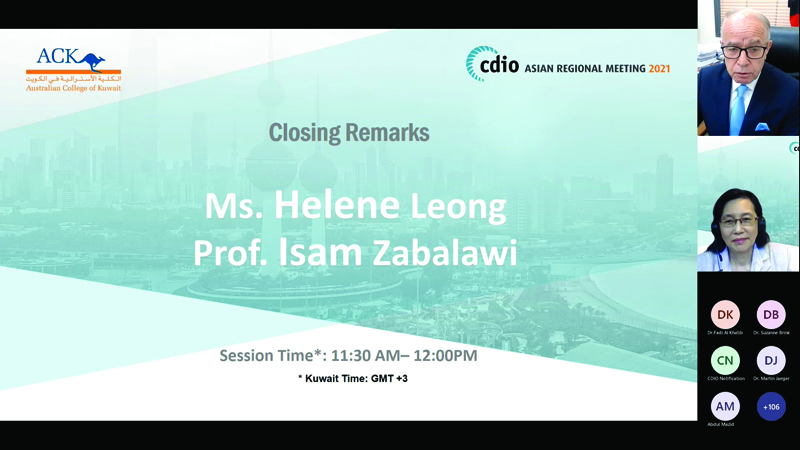 KUWAIT: A screenshot from the meeting.
KUWAIT: A screenshot from the meeting.
KUWAIT: Under the patronage of Omar Ali Al-Kandari, Acting Secretary-General of the General Secretariat of the Private Universities Council in Kuwait, the Australian College of Kuwait (ACK), successfully hosted the 2021 Conceive-Design-Implement- Operate (CDIO) Asian Regional Meeting virtually. Held for the first time in the Gulf Region, the international meeting took place over the course of three days, from October 26 to 28.
The CDIO Asian Regional Meeting focused on the theme "Post Pandemic Higher Education", bringing together leading CDIO experts from the globe to conduct various presentations and workshops about the most up-to-date CDIO engineering education approach, the best practices, and recommendations post-pandemic to favor the higher education sector in Kuwait specifically and in the region.
The meeting attracted a local and international audience from various teaching backgrounds, primarily engineering instructors, industry leaders, and CDIO specialists. The CDIO meeting served as a platform to share knowledge and experience about the CDIO engineering education approach, best-practice teaching methods adopted during and post-pandemic, and much more.
Following the opening ceremony, Omar Al-Kandari, Acting Secretary-General of the General Secretariat of the Private Universities Council, delivered his speech by welcoming the attendees and congratulating ACK for successfully launching the meeting after several months of preparations. He said: "The Ministry of Higher Education is very proud to hold such meetings in Kuwait, especially since the topic is Post-Pandemic Higher Education. This meeting reflects the education path adopted by Kuwait that stresses the importance of education and its strong impact in making a change".
Adding: "Without a doubt, this meeting is a strong platform for exchanging knowledge and expertise, and will enhance the best practices in education in addition to strengthening strategic partnerships that will produce the next generation of engineers who will be able to make an impact after they graduate."
Subsequently, Prof Isam Zabalawi - President of ACK, welcomed the meeting's guests and expressed his delight in being amongst representatives of such distinguished educational institutions. Prof Zabalawi stressed on ACK's continuous support for the CDIO initiative by adopting the project-based learning (PBL) method to develop CDIO skills and has further renewed the agreement with the Aalborg University of Denmark to further this purpose.
Further noting on ACK's efforts for the initiative, Prof Zabalawi said: "We are proud as ACK to be an active member of the CDIO community; we are in an excellent state to spread the vision and the mission of CDIO in the region. So far, we have made exhibitions explaining different aspects of CDIO for the engineering communities in Oman, Qatar, Jordan, and Lebanon."
Jonathan Gilbert - the Australian Ambassador to Kuwait, also gave an introductory speech. He congratulated ACK for hosting the event, noting that it is a testament to the College's impressive growth continued evolution, and ongoing success. highlighted the importance of engineers taking an active role in preparing for the pressing issues facing the world and educating engineers to tackle these issues.
Guest Speaker, Alastair Dawson - Vice-President of Global Development at Central Queensland University Australia, ACK's international partner, delivered his speech in which he noted the need for engineers and educators to adapt and learn new techniques to stay ahead of the curve with the advent of mass technological shifts and the more recent difficulties introduced by the COVID-19 pandemic.
Following Dawson's speech, Louis Field - Client Manager at Engineers Australia, spoke to point out the important roles that engineers fulfill as the problem solvers of society. Field also stressed on the importance of collaboration between academia and industry to ensure that the civilizations continue to thrive through adversities.
Regarding Engineers Australia's partnership with ACK, Field noted ACK is leading the way in the Middle East with its efforts to advance and improve the engineering profession and cited that the 2021 CDIO Asian Regional Meeting as one example of that. He added: "We are particularly proud of our partnership with the ACK, transcending borders to offer a greater level of professional development to all their students, and recognition and support to their academic team."
Dr Mohammed Abdul Niby - Dean of the School of Engineering at ACK, spoke next, elaborating that engineering education needs to continuously evolve to prepare engineers for the growing demands of industry and that shifting away from traditional problem-solving and design skills will allow future engineers to innovate new solutions for an array of social, cultural, environmental and ethical issues.
From her end, Helene Leong - Director of the Department of Educational Development at Singapore Polytechnic and Co-Chair of CDIO Asian Region, thanked all participants and organizers while briefly introducing the CDIO initiative, explaining it as an educational framework adopted by 200 universities around the world for their curricular planning and outcome-based education. Affirming CDIO's goals, Leong said: "CDIO's vision is to be the leading world-wide collaborative network for innovative engineering education, to produce responsible engineers who make a difference in the world through innovation and creative, workable solutions."
Concluding the successful 2021 CDIO Asian Regional meeting, Prof Isam Zabalawi thanked all the participants for their efforts and time in attending; he said: "There is an unquestionable need for us to reflect the outcomes of these presentations and discussions in our teaching and learning environment. By integrating them into the CDIO standards and syllabus to update the initiative and strengthen our institutions' role in serving engineering education and the profession worldwide, ACK will continue to raise awareness for the initiative in the region and hope that other universities will join".
Continuing, Prof Isam cited many of the lessons learned through the various keynote speeches and workshops during the meeting, highlighting how their implementation can help further education by producing graduates with the right skills and appropriate attitudes.
.jpg)



